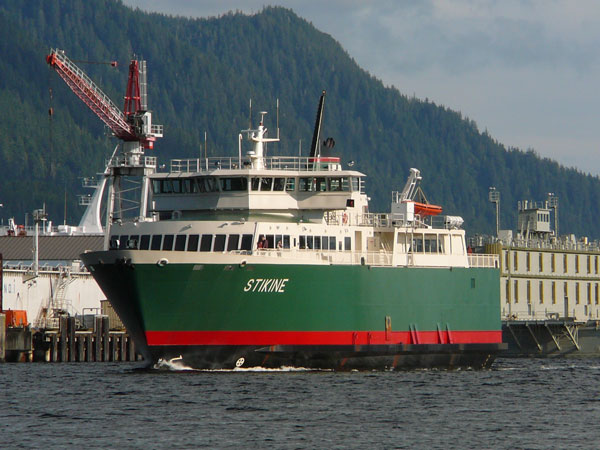
The financial picture is improving for the Inter-Island Ferry Authority, which connects Prince of Wales Island and Ketchikan. But the southern Southeast system still needs more money to maintain a full schedule all year.
Prince of Wales Island counts on the daily sailings of the Stikine, run by the Inter-Island Ferry Authority.
“It gives us daily, year-round access for business and travel and recreation to the rest of the world,” says Sharon Brosamle, who works with the island’s chamber of commerce.
One example, she says, is some people she knows who run a fish-processing operation.
“It’s just because of daily ferry service that they were able to continue to operate and stay in business because they could get their product over to Ketchikan for shipping,” she says.
The Inter-Island Ferry Authority is separate from the Alaska Marine Highway System. But it’s still gotten funding from the Legislature.
That wasn’t the case this year. So the authority was left scrambling to fill a $750,000 gap in its $4-million annual budget.
General Manager Dennis Watson says that’s changed.
“We have it pared down. If all goes well, it may look more like a half a million dollars or a little bit less,” Watson says.
He says the authority got $100,000 more than expected from a federal grant.
“There’s also another federal transit program. It’s a discretionary ferry boat money program that looks like it might bear some fruit too. We’re just not too sure yet,” he says.
The authority is also able to carry over funds from the previous budget year, which ended June 30th.
That’s because fuel cost less than expected.
“That will bring us in a couple more bucks as well. But we still have a ways to go to get where we need to be right now,” he says.
Watson says the authority is talking to the governor’s office about some help.
Office of Management and Budget Director Karen Rehfeld says the administration is considering options, but has made no decisions. One option could be an appropriation in the governor’s next supplemental budget.
In the meantime, the authority has to consider what to do about a shortfall.
About three-quarters of the authority’s budget is covered by passenger and vehicle fares. So cutting service also means losing revenue.
Watson says a lot depends on outside factors, such as the fishing industry.
“If we end up with a huge purse seine fleet out here this year or troll fleet, because there’s just lots of cohos, that all transfers to the people getting on the ferry and going back and forth in between here and Ketchikan. Or going over there to catch a plane to go somewhere else when they have a couple of minutes off,” he says.
Watson says one of the authority’s largest customers is the E.C. Phillips fish-processing plant, which trucks salmon from Prince of Wales to Ketchikan.
There’s also tourists, hunters and sport fishermen.
But he says so far, summer passenger loads have been nothing special.
“Although these last few days, it’s been kind of like a rocket went off. I hope that continues. A full boat goes a long ways toward helping us out, in the end play.”
Prince of Wales and nearby communities formed the authority in 1997. It started sailing in 2002, replacing and increasing service previously provided by the state ferry system.
The IFA later added a second route linking Coffman Cove, Wrangell and Petersburg. But it didn’t attract enough customers to continue.
A separate nonprofit group called the North End Ferry Authority plans to take over that route, plus one from Coffman Cove to Ketchikan, starting next year.
Ed Schoenfeld is Regional News Director for CoastAlaska, a consortium of public radio stations in Ketchikan, Juneau, Sitka, Petersburg and Wrangell.
He primarily covers Southeast Alaska regional topics, including the state ferry system, transboundary mining, the Tongass National Forest and Native corporations and issues.
He has also worked as a manager, editor and reporter for the Juneau Empire newspaper and Juneau public radio station KTOO. He’s also reported for commercial station KINY in Juneau and public stations KPFA in Berkley, WYSO in Yellow Springs, Ohio, and WUHY in Philadelphia. He’s lived in Alaska since 1979 and is a contributor to Alaska Public Radio Network newscasts, the Northwest (Public Radio) News Network and National Native News. He is a board member of the Alaska Press Club. Originally from Cleveland, Ohio, he lives in Douglas.




